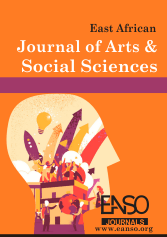Assessment of the Contributions of Religious Activities on Students’ Academic Performance in Higher Learning Institutions of Mbeya City
Abstract
This study assessed the Contributions of Religious Activities on Students` Academic Performance in the Higher Institutions of Mbeya City. The specific objectives of this study were: To identify the kind of religious activities available at Catholic University of Mbeya (CUoM), to examine the contribution of religious activities on students` academic performance at CUoM as well and to find out the strategies for enhancing religious activities to enhance students` academic performance at CUoM. The study used a Convergent parallel design in the investigation. Purposive sampling and the simple random sampling technique was applied to get the respondents to participate in the study. The target population comprised third-year students, instructors and religious leaders of CUoM. In order to get data from the respondents, the researcher used questionnaires for students and instructors and an interview guide for religious leaders. Quantitative data was analysed in the form of frequency and percentages and presented in tables with the help of the Statistical Package for Social Sciences (SPSS) Version 21. Qualitative data was analysed through building themes, narration and direct quotations from respondents. The findings revealed that the religious activities done at CUoM are prayer groups, religious studies courses, religious clubs, religious counselling services, seminars, visiting the needy people, religious teachings, also religious mentorship programs. Also, the findings revealed that among the contributions of religious activities at CUoM are to influence good behaviour in Students, influence studying hard, encourage good relationships among Students, enhance guidance and counselling to Students, create fear of God in Students, as well as motivate Students to reach their dreams. Again, the findings on the strategies for enhancing religious activities on students’ academic performance at CUoM include employing more religious teachers, creating a religious timetable at the university, allocating rooms for religious activities, improving good relationships between the university and religious leaders, as well, improving a good environment for implementing the religious activities and motivating irreligious students to engage in religious activities. The study concluded that the presence of religious activities in universities increases Students' academic performance because they encourage students to study hard, provide guidance and counselling to Students, instil fear of God in Students and motivate Students to reach their dreams. Thus, government and other education stakeholders should work on this by employing more religious teachers and ensuring a good environment for religious activities, like the presence of a hall for religious activities. The researcher recommended that the religious institutions should be given enough opportunities for providing religious education in the university, good relationships between universities and religious institutions, like churches, should be maintained, and there should be connectivity between religious leaders and the university’s administration so as to support the program of conducting religious activities.
Downloads
References
Aggrey, A. A. (2020). The Involvement of Religious Organizations in Implementation of Curriculum in Public Secondary Schools in Former Western Province of Kenya. International Journal of Academic Research in Bussiness and Social Sciences, 10(7), 130-149.
Ali, M. A., Rathore, F., Siddique, D. (2019). The Impact of Religious Practices and Values on Academic Achievements of Students at Secondary Level. Journal of Education and Practice. 10(12). 38-40
Babalola, O. (2022). Faith and Academic: The Role of Religion in Higher Education. Lagos: Zenith Educational Publishers
Bentzen, J. (2020, June 9). “Rising religiosity as a global response to COVID-19 fear”.
Chesaro, D. (2012). Religious education in the moral development of the schools. Nakuru Kenya: Nairobi University Press.
Davis, K. (2006). The social impact religious. Dar es Salam. Dar es salam: Santiago University Press.
Gunckel, K. L. (2017). The Role of Religion in Academic Excellence: Motivating Factors and Outcomes. Journal of Educational Psychology. https://doi.org/10.1037/edu0000143
Jeynes, W. H. (2002). Why religious schools positively impact the academic achievement of children. International Journal of Education and Religion, 3(1):16-32.
Jeynes, W. H. (2003). Why religious Universitiess positively impact the academic achievement of children. International Journal of Education and Religion 3(1), 16-32.
Kamau, P. (2016). The influence of religious activities on academic performance in Kenyan universities. International Journal of Educational Studies, 10(2), 78-89.
Ludger Woessmann, L. Z. (2022). Religious education in Universities affects students’ lives in the long run. German: Ludwig-Maximilians University of Munich (LMU.
Maria, R. & Manullang, J. (2025). Challenges of Learning Christian Religious Education in Inclusive Education in the Digital Era
Marripedia. (2020). Effects of Religious Practices on Education
Mwakalindile, J. (2019). The influence of religious activities on students' behavior and discipline in Tanzanian universities. Journal of Universities Psychology,8(3), 78-91.
Mwakibinga, L. (2017). Religious activities and academic performance in Tanzanian universities. Journal of Religion and Education, 15(4), 112-125.
Nakabugo, A. (2019). The role of religious schools in academic performance in Uganda.African Journal of Education, 5(1), 34-45.
Niyongabo, B. (2017). Religious activities and academic achievement in Burundi schools. Journal of African Studies, 12(2), 67-78.
Prossy Nandagire, et al. (2023). A Comparative Analysis of the Effects of Academic and Non-Academic Outcomes of Faith-Based Education on Students in Public Secondary School. Advances in Social Sciences and Management, Vol-1, No-8, pp. 93-103.
Osanloo, A., & Grant, C. (2016). Understanding, Selecting and Integrating a Theoretical Framework in Dissertation Research: Creating the Blueprint for Your "House". Administrative Issues Journal: Connecting Education, Practice, and Research, 4, 12-26
Owusu-Ansah, K. (2018). The impact of religious activities on academic performance in Ghanaian schools. Journal of Educational Psychology, 25(1), 56-67.
Smith, J. (2018). The role of religion in public schools: Journal of Education Policy, 20(3), 45-60.
Ubeysekara, I. H (2016). The Impacts of Religion in University on Young University Students an Ethnographic Inguiry. Vol.4
Copyright (c) 2025 Mariapia Bartazary Kayombo

This work is licensed under a Creative Commons Attribution 4.0 International License.




























